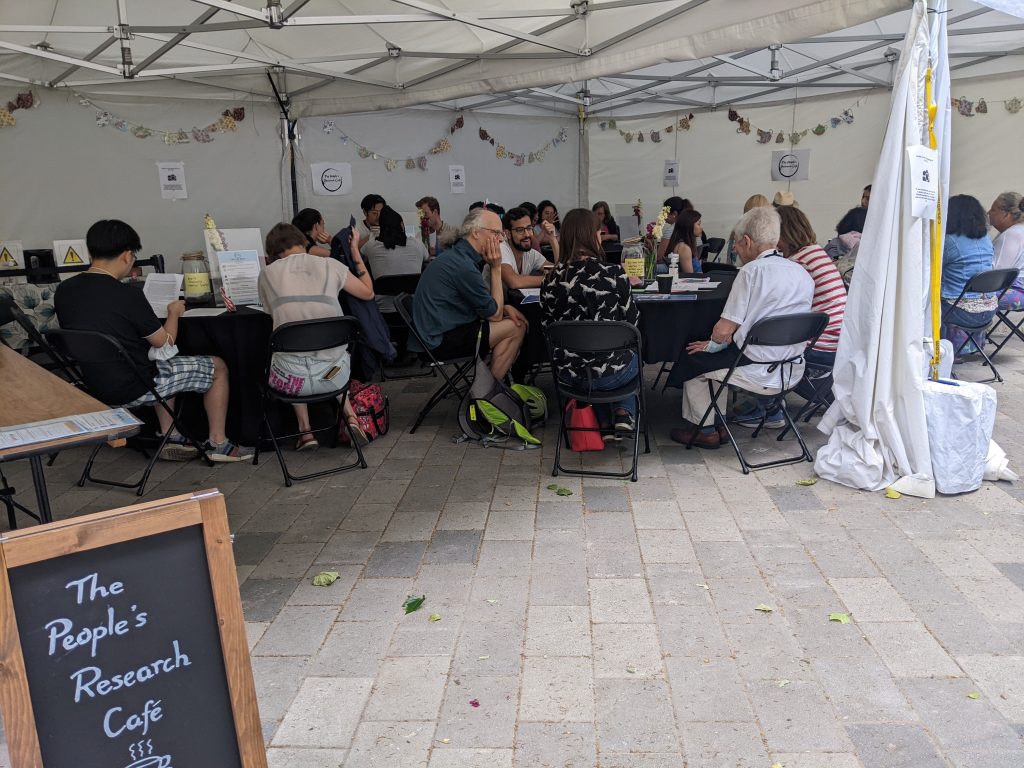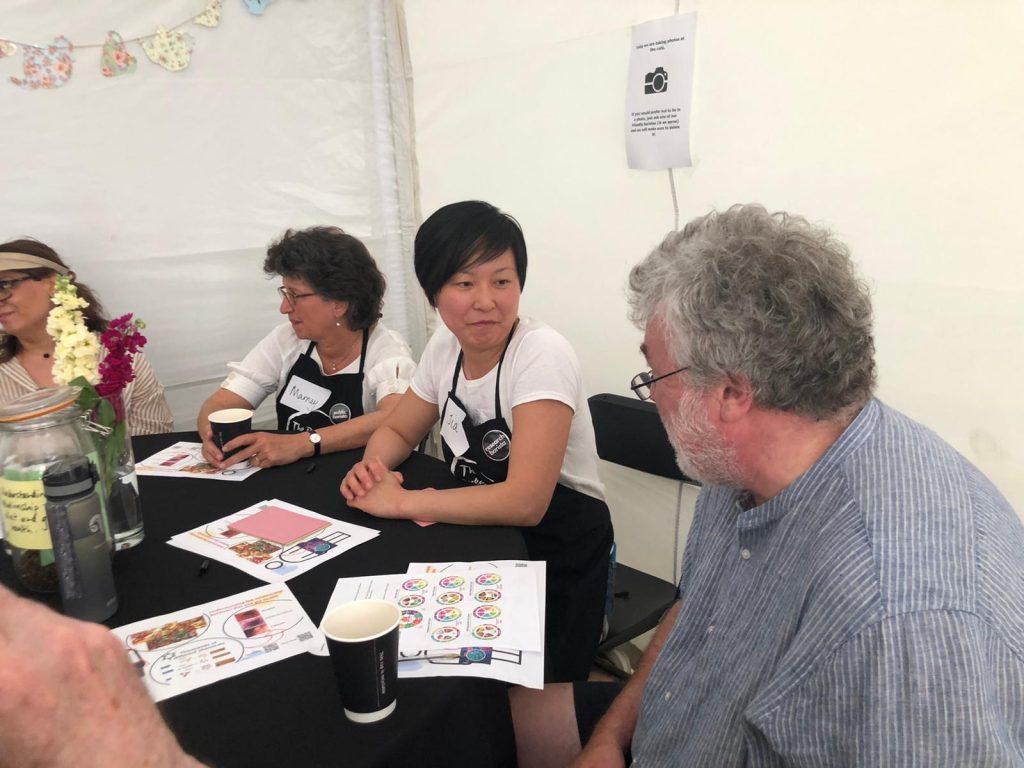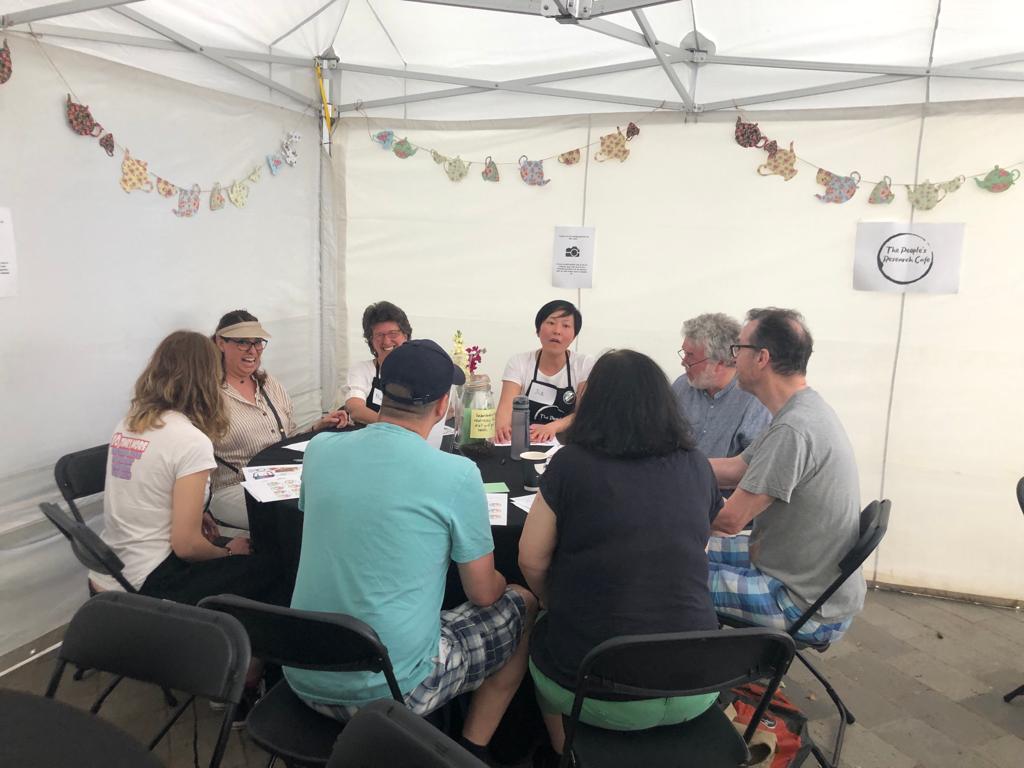- Understanding the relationship between diet and gut health
- Understanding the impact of digital technologies on patient safety
- Developing an alternative to blood tests for health investigation through a microneedle biosensor device
- A coffee for your thoughts: How and when can we personalise medicine?
- Analysing patient feedback to improve patient-centred care
- Artificial Intelligence in healthcare: exciting but complex
- Can a daily food supplement prevent weight gain?
- Developing a new technology to diagnose a virus that can lead to disabilities in new born babies
- A great day on Great Exhibition Road!
- Bringing together experts in public involvement, researchers, public partners, and the public to improve early-stage research projects
- Understanding the role of gut hormones on appetite and eating behaviour
This blog is part of a series showcasing the People’s Research Cafe which took place on the 18th and 19th June 2022 in South Kensington, London as part of the Great Exhbition Road Festival.
 What is a People’s Research Café?
What is a People’s Research Café?
The People’s Research Cafe is a café with a twist. Visitors are welcomed to sit down at a table co-hosted by an Imperial College researcher and a public contributor whose role is to help the conversation flow freely. Over a free hot drink, visitors find out about the researcher’s project and will be asked for their opinions on it. The researchers are then expected to use this feedback from visitors to improve their projects. The People’s Research Café has been run previously at two Imperial Festivals (2018 and 2019) and also in four community venues. It was previously called the “PPI Café” and you can read about the one at the Imperial Festival 2018 here.
When did this People’s Research Café take place?
A People’s Research Café was hosted at the Great Exhibition Road Festival held on 18 and 19 June 2022 and was a collaboration between the following teams/centres: Imperial Biomedical Research Centre, Imperial Clinical Trials Unit, Imperial Clinical Research Facility, London In-Vitro Diagnostics Cooperative, NWL Applied Research Collaborative, MRC Centre for Environmental and Health, HPRU in Healthcare Associated Infections and Antimicrobial Resistance. Researchers from each centre were given the opportunity to apply to host a table at the Café for 2 hours where they would explain their research in plain language and ask visitors 3 questions with the help of a public contributor. It was a requirement that the research project was at a stage where visitor feedback could still influence the project. Researchers and public contributors were offered training about how the Café would work and how to maximise conversations with visitors. Ahead of the Café, researchers refined their plain language summaries and three questions to pose to visitors with the help of public involvement leads and a public contributor.
In conversation with: Maria Valdivia-Garcia – Research Associate (Role at the Cafe: Research Barista, Welcomer), Maria Glymenaki – Research Associate, (Role at the Cafe: Research barista, Welcomer), Miss Yang Bi – PhD student (Role at the Cafe: Research barista, Welcomer), Jia Li – Reader in Biological Chemistry, (Role at the Cafe: Research Barista) from the Department of Metabolism, Digestion and Reproduction – Imperial College, London
What research project did you bring to the People’s Research Café and what is it about?

The human gut has an extremely complex environment with many different microbes, such as bacteria, living there. There are also thousands of different chemicals (called metabolites) present. These metabolites can be readily found in the food we eat and in the gut after digestion or produced by the bacteria living in our gut. Metabolites in our gut are like instruments in an orchestra; each metabolite, as an individual instrument, plays in harmony to create a balanced environment. This balanced environment is crucial to protect us from diseases. However, we do not know what determines this ‘balance’; in other words, which metabolites are present and in what amount after consuming different foods as part of our unique diets. We also do not understand how these metabolites provide protection from diseases. Therefore, our goal is to find answers, such as which metabolites are harmful or beneficial to our gut and how they work together. We hope our studies will help people to choose dietary habits which create a harmonious gut environment and reduce the risk of developing infections or gut diseases.
What questions did you ask visitors to the People’s Research Café about your project?
We asked the visitors to the People’s Research Cafe the following three questions:
- Which research question is more important to you?
-
- how someone’s sex (i.e., male or female) has an impact on how they respond to different diets?
- how someone’s age (i.e., children (3-18 years old), adults (18-65 years old) and elderly adults (above 65 years old) has an impact on how they respond to different diets?
- Which type of the following diet would you like us to study to understand how it affects the gut environment?
-
- Western diet
- Mediterranean diet
- Ketogenic diet
- Vegetarian
- Vegan
- High protein diet
- Which of the following do you think we should focus on to understand how they affect our gut environment? Select the top 3 from the list below.
-
- Fibre-rich food (e.g., legume)
- Fish
- plant-based food (veg, tofu, fruits)
- mushroom-based food e.g., Quorn
- Salt
- Sugar
- Unsaturated fat (e.g., olive oil, grape seed oil)
- Fermented/processed food (e.g., cheese, ham, cured meat)
What did visitors tell you?
Feedback on the area of research we should focus on
62% of the visitors chose to prioritise studies which look at the relationship between age and responses to diet over studies exploring the relationship between sex and dietary responses. A smaller percentage (6%) thought both age and sex were equally important to study.
Feedback on the type of diet which we should focus on
When we asked the visitors about the types of diet they would like us to study, interestingly and somewhat expected, the answers were diverse. 27% of the visitors selected vegetarian diet, and 22% chose Mediterranean diet. Between 13% and 17% of visitors selected other diets, such as vegan, high protein and western diet. Many visitors also expressed their interests in how we respond differently to Western diet compared to other types of healthy diet. Some visitors also commented on the diversity of the diet we are studying and suggested Asian diet should also be included.
Feedback on the specific food elements we should focus on
Similar to the answers from Question 2, visitors showed interests in a wide range of different dietary components. Many of them mentioned that all foods are interesting to investigate. However, they appreciated that due to limited time and resources, researchers need to prioritise some food components. The types of food that received high percentages of votes included fermented food (20% of visitors), plant-based food (17%), food with unsaturated fat (13%) and mushroom-based food at 12%.
Other comments and priority areas raised
Throughout the two hours, we had opportunities to chat with >50 visitors on a range of diet and health-related topics. Some visitors mentioned that the relationship between diet and mood or state of mind was also important to evaluate when researchers look at different diets. Some people mentioned about the health impact of new foods that were never consumed before in a specific population. For example, people in the UK eating food products from Latin America is nowadays more common compared to a few decades ago. How does the digestive system cope with the new dietary products? Do people living in the UK have the same responses as Latin Americans who have thousands of years’ history of consuming this product? Ethical concerns about food products were also raised by visitors. For example, exporting some superfoods such as quinoa or avocado could deprive indigenous populations’ need.
How will what visitors told you impact and/or change your project?
Feedback from visitors has helped us to understand the priority areas for us to investigate as part of our studies. So far, we have taken into consideration factors such as sex when looking at our results in combination with other socio-economic factors (comparisons between urban and rural populations for example). For going forward, we plan to also look into age-related responses to the diet, especially comparing Western diet to other types of diets, such as vegetarian diet. In addition, the feedback from participants also suggested that future studies could focus on how the fermented food and plant-based food influence our gut health.

What was your personal experience of taking part in the People’s Research Café?
Our team had 5 members with additional support from a public barista and the PERC team. It was our first time participating in a People’s Research Café and we have learnt a lot and it felt very rewarding.
Here are some quotes from our team members:
“It was quite challenging and intimidating to approach people in the middle of the street for the first time. I had never done a survey or worked in retail before; therefore, I didn’t know what the best way would be to attract people to the Café at the beginning, but little by little I started to get more confident on how to approach and talk to them. Not only did I bring people into the café, but also talked to them about our questions and conversed with visitors about our future research. At the end, I gathered valuable information and experience. This event helped me get out of my comfort zone and tailor the language in a way the public could understand easily when approaching members of the public.” – Dr. Maria Valdivia-Garcia
“I have had extensive experience in participating in public engagement events; however, participating in a public involvement event as the Research Café was something new to me. I found it exhilarating how much interest visitors showed in our research, and I engaged in some brilliant discussions over the table drinking tea or coffee. The only challenging part was that I was also a welcomer, meaning I oversaw talking to people and bringing them to the table. I found it hard to approach some of them in the beginning. As the time passed, when someone stopped looking inside the Research Café, I approached them asking if they would like to learn more and I always mentioned as a bonus they will have free tea or coffee. In the end, I managed to bring quite a lot of people that they sat in the table talking with researchers. I also gathered more than 20 forms answering a questionnaire my group had prepared on diet. My attendance in Research Café helped me in gaining a different view on some research questions and refined the way I communicate research ideas to people with no expertise on my field.” – Dr. Maria Glymenaki
“The Research Café was a great experience and opportunity to discuss our research with the public. The discussions I had shed light on people’s current and future expectations of Nutrition science and reframed my own views on the questions we asked the visitors. As a welcomer, I was in charge of attracting people to the Research Café and giving an introduction to the event’s concept and the research questions they will have a chance to consider during the event. It was particularly challenging at first to get people involved but as time went by and with a little practice, I felt more confident to engage with more people and take part in interesting conversations.” – Kaoutar Abaakil
We would highly recommend the Café to other researchers because this event provided a unique opportunity for us to involve the public into our research projects through the focused questions we prepared. Besides, through the multiple conversations with the public members on a table, we shared different perspectives on food and health and some of out-of-the-box ideas were inspired for future research.
